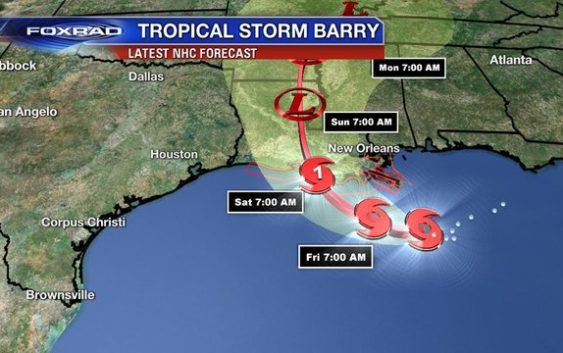- National memorial to honor NC firefighter who died on duty during Hurricane Helene
- Gov. Josh Stein extends State of Emergency for western NC wildfires
- Governor Stein extends state of emergency for NC wildfire threat
- Governor Stein extends emergency in 34 NC counties amid wildfire threat
- Texans can buy emergency preparation supplies tax-free April 26-28 ahead of severe weather season
Tropical Storm Barry heads for Louisiana

NEW ORLEANS (AP) – Tropical Storm Barry has formed in the Gulf of Mexico, and presents twin troubles for coastal Louisiana and Mississippi – the possibility that the flooded Mississippi River will be lapping at the tops of levees this weekend, and a danger of flash floods like the one that unexpectedly walloped New Orleans on Wednesday.
The U.S. National Hurricane Center says the storm’s maximum sustained winds Thursday morning are near 40 mph with additional strengthening expected during the next day or two.
A tropical storm warning is now in effect for the Louisiana coast from the mouth of the Pearl River to Morgan City.
The Gulf of Mexico disturbance that dumped as much as 8 inches of rain just three hours in parts of metro New Orleans was forecast to strengthen into a tropical depression Thursday, then a tropical storm called Barry Thursday night, and, possibly, a weak hurricane by Friday. But by Thursday morning Tropical Storm Barry has already formed.
The biggest danger in the days to come is not destructive winds, but ceaseless rain, the National Hurricane Center warned: “The slow movement of this system will result in a long duration heavy rainfall threat along the central Gulf Coast and inland through the lower Mississippi Valley through the weekend and potentially into next week.”
RELATED: New Orleans floods as Gulf Coast braces for torrential rains
Forecasters said Louisiana could see up to 12 inches of rain by Monday, with isolated areas receiving as much as 18 inches. And the storm’s surge at the mouth of the Mississippi could also mean a river that’s been running high for months will rise even higher.
Southeastern Texas also was at risk of torrential rains.
Good morning, guys. This tropical system still hasn’t become a depression, but is expected to today. The path is well east of the Houston area, but don’t be surprised to see a few bands of thunderstorms here from time to time. This is a major flood threat for LA and MS. #Barry pic.twitter.com/HdjMvSeF7o
— Mike Iscovitz (@Fox26Mike) July 11, 2019
New Orleans got an early taste Wednesday of what may be in store. News outlets said a tornado may have been responsible for wind damage to one home, while floodwaters invaded some downtown hotels and businesses as streets became small rivers that accommodated kayakers. The floods paralyzed rush-hour traffic and stalled cars around the city.
It all happened fast.
“I must have got to work about a quarter to 7,” said Donald Smith, who saw his restaurant on Basin Street flood for the third time this year. “By 7:15, water was everywhere.”
It brought memories of a 2017 flash flood that exposed major problems – and led to major personnel changes – at the Sewerage and Water Board, which oversees street drainage. City officials said the pumping system that drains streets was at full capacity. But the immense amount of rain in three hours would overwhelm any system, said Sewerage and Water Board director Ghassan Korban.
RELATED: National Hurricane Center: List of 2019 hurricane names
The Mississippi is already running so high that officials in Plaquemines Parish at Louisiana’s southeastern tip ordered evacuations of some areas to begin Thursday. A voluntary evacuation was called on Grand Isle, the vulnerable barrier island community south of New Orleans. Gov. John Bel Edwards declared a statewide emergency in light of the gathering storm.
A spokesman for the Army Corps of Engineers in New Orleans said the agency was not expecting widespread overtopping of the levees, but there are concerns for areas south of the city. The weather service expects the river to rise to 20 feet (6 meters) by Saturday morning at a key gauge in the New Orleans area, which is protected by levees 20 to 25 feet (6 to 7.6 meters) high.
The Corps was working with local officials down river to identify any low-lying areas and reinforce them, spokesman Ricky Boyett said. He cautioned that the situation may change as more information arrives.
“We’re confident the levees themselves are in good shape. The big focus is height,” Boyett said.
Edwards said National Guard troops and high-water vehicles would be positioned all over the state.
“The entire coast of Louisiana is at play in this storm,” the governor said.
New Orleans officials have asked residents to keep at least three days of supplies on hand and to keep their neighborhood storm drains clear so water can move quickly.
As the water from Wednesday morning’s storms receded, people worried about what might come next.
Tanya Gulliver-Garcia was trying to make her way home during the deluge. Flooded streets turned a 15-minute drive into an ordeal lasting more than two hours.
“This is going to be a slow storm … That’s what I’m concerned about,” she said.
Tourists Floyd and Missy Martin of Raleigh, North Carolina, were trying to make the best of it at a store with puddles on the floor where they were buying an umbrella, chips and peanuts, and two bottles of merlot.
“We could drown out our sorrows or make an adventure of it,” Floyd Martin joked.
Associated Press reporters Chevel Johnson and Janet McConnaughey contributed to this story.
FOX 26 HURRICANE TOOLBOX